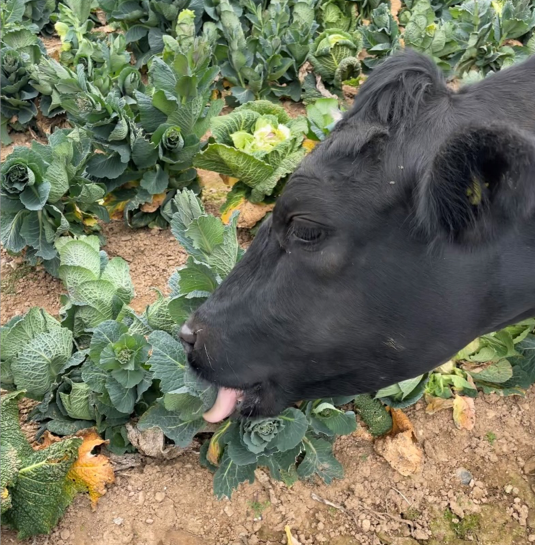
A FNZ event held in March at Andrew Brewers FNZ demo farm Ennis Barton.
Farmers, growers and advisors met at Demo Farm Ennis Barton near Fraddon to learn how Andrew has integrated vegetable production with his grass-based dairy. Depending on grass production, after six years, fields are rented out to Riviera Produce for cabbages. These are established using a strip-till machine to minimise soil disturbance. Following harvest, any leftover cabbages are grazed by Andrew’s youngstock, before going into spring barley or a grass ley. Andrew is particularly keen on grazing the vegetable residue, as it makes the material “more palatable to the underground livestock” and provides valuable grazing. We also heard from James Wimpress of the Environment Agency, on how to reduce the risk of soil loss from vegetable fields – an important consideration as soil erosion releases carbon as well as removing a valuable asset. Jan Dinsdale from Cornwall Wildlife Trust spoke about the Environmental Land Management Scheme (ELMS) Test and Trial. This event was made possible with thanks to the National Lottery Community Fund who fund the Farm Net Zero project.
Key takeaways:
- Fields for vegetable production should be selected carefully – flattish, with minimal erosion risk.
- ELMS is more targeted than previous subsidies but can cover some costs for important soil tests.
- Integrating livestock and vegetables can reduce bought-in feed requirements.
Growing field vegetables can be an important income stream and break crop, as well as contributing to the nation’s self-sufficiency. However, they can also damage the soil if not grown sensitively. Methods of growing field vegetables in a rotation with grass and cover crops can help to mitigate any soil erosion and improve the rate of soil health recovery and soil carbon capture.
What next?
Andrew’s vegetable fields will now go into either spring barley, grass leys or cover crops and will be assessed to determine which option can restore soil health and capture carbon the fastest. An earlier FNZ cover crop trial on Andrew’s farm, plus Blable (Demo Farm) and Tregooden (Monitor Farm), showed encouraging results for diverse cover crops and their impact on soil health. The trial results can be seen here.

